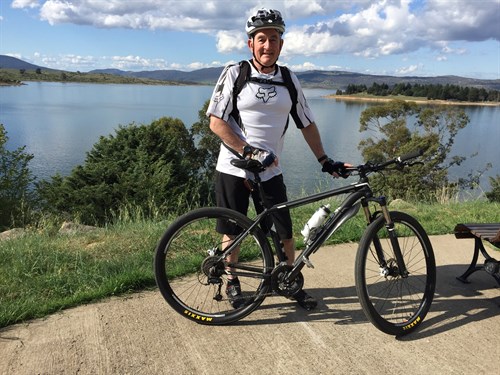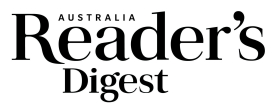Relationships
My partner's aneurysm brought us closer than ever

No-one would ever describe me as having the qualities needed in a nurse. It's not that I am incapable of being caring and showing empathy. It's just that those are not my strongest traits.
My partner of almost 20 years is a tall, fit and strong man. He's a firefighter who seemed invincible - until recently.
About four years ago, when he was almost 60 years old, a routine test showed that Ian had an aneurysm, like a bulging garden hose, in his aorta in his upper abdomen. It was a ticking time bomb discovered by accident. We were about to leave for a cycling holiday in France. Our GP said that cycling would be okay but Ian's planned ascent of two of the iconic climbs in the Tour de France was off the agenda.
Ian struggled to process this betrayal by his body - a body he had relied on and never had cause to doubt. He'd been an action-man all of his life. He went through phases. He'd been a long distance runner, played rugby and Aussie Rules - he was still playing Aussie Rules when he was 43 years old. He'd been a surf lifesaver, a surf boat rower and beach sprinter. He'd been an abseiler and caver. He was a cross country skier and downhill ski racer. He was a keen cyclist who entered masters races and took up mountain biking in his late 50s. He was a kayaker. It was difficult to find a sport he hadn't pursued.
During the four years the aneurysm was being monitored, it was a constant presence that threatened to suck the joy out of our lives. We each dealt with it differently. Ian alternated between an attitude of deep despair and one of resolute optimism that it could, and would, be fixed. I was in a world of denial. My fear of abandonment (my parents had died quite young and I'm an only child) kept me from facing reality. Deep in the darkest corners of my soul I was building self-protecting walls.
The aneurysm grew each year and in late 2014 it had reached the point where the danger of it bursting, causing death within minutes, was greater than the risks of the operation. The location of Ian's aneurysm meant that he couldn't have a minimally invasive endo-vascular procedure but required a major operation, scheduled for early March 2015.
A pre-operative routine heart test in late January delivered devastating news. Ian had a second aortic aneurysm attached to his heart. It had caused his aortic valve to stretch and leak and his heart had enlarged to compensate. The vascular surgeon was astonished that Ian hadn't shown any symptoms, he expected someone with Ian's heart condition would be exhausted just brushing his teeth.
Early February was a blur of medical appointments. Within a week of seeing the cardio-thoracic surgeon Ian had open heart surgery to replace the valve and repair the aneurysm. He was on the operating table for seven hours and when the surgeon spoke to me afterwards he said it was much more complex and challenging than he had expected.
I will never forget what it was like to walk into the ICU and see Ian in an induced coma, with a breathing tube, beeping machines and nine different drips. His anaesthetist was a lovely man who had given me clear instructions the night before when he had come for a pre-op visit. "Your job", he said to me, "is to hold his hand and tell him you love him. They say that people can't hear what is being said while they are under but they can".
At first I sat at the bottom of the bed because the nurses were still bustling about getting him settled. Then the pace of the activity changed slightly, and one of the nurses asked me if anyone had explained what was happening. When I shook my head he said, "one of his lungs has collapsed so we have to put in a drain. I have to ask you to go back into the waiting room for about half an hour - we'll come and get you". I burst into tears and one of the nurses hugged me and walked me back to the waiting room.
When I came back in I was doing my job very diligently. I was holding Ian's hand and speaking to him softly. I told him the operation had gone well and that Michael, his surgeon, was very pleased with the outcome. I told him that I loved him and he started to try to open his eyes. I said to the nurse, "he opened his eyes". He replied, "that's wonderful, that's fantastic news, it's a really good sign. I'm just going to turn up his sedation."

Above: Ian on our first bike ride after the surgery. Top: Helen and Ian at his daughter's wedding four months after his surgery.
We live in Canberra and Ian was in hospital in Sydney so I took two months off work while Ian was in hospital and to care for him during his recovery. I was apprehensive about my ability to take on the role of "Nurse Helen" when Ian was discharged but I needn't have worried. I discovered that when it really, really matters it's possible to develop a side of yourself that you didn't think existed. Any time I felt the tiniest bit impatient, I only had to conjure up the image of Ian lying in ICU dwarfed by the machines and tubes keeping him alive and my impatience would disappear into the ether.
It helped that Ian was incredibly brave, relentlessly positive and grateful for surviving phase one, as well as for my care.
His recovery had a deadline. The vascular surgeon wanted him to be fit enough to endure the second surgery to repair the abdominal aneurysm in June. Ian spent three months dutifully attending his cardiac rehabilitation classes and focussing on regaining as much fitness as he could.
I don't know how he found the courage to undergo the second operation so soon. He said it's easy when you don't have a choice.
In early June he had a massive operation to replace 14 centimetres of his aorta. It was complicated and difficult and he was on the table for seven and a half hours. He had a 65 cm surgical wound - the doctors on the ward called it the "Samurai cut". He came through the operation better than expected initially and was breathing on his own within 24 hours. Then came the downhill spiral.
My lasting memory is from day three was when the nurses in ICU had moved Ian to a chair to help clear his lungs. His skin was grey and he was in a fog of pain. His vascular surgeon called in on his rounds and gently took both of Ian's hands in his and urged "Don't give up Ian. Don't give up". I have never been so frightened.
Ian's kidneys were failing so he was put on dialysis for a few days and that was enough to kick-start them again. He spent 10 days in ICU and then another 10 on the ward. The main issue was getting his kidney function to an acceptable level.
When I resumed the role of "Nurse Helen" almost three weeks after his operation it was a much harder gig. Ian was in a lot more pain and was even more restricted in what he could do. It has been a slower recovery than we imagined, even though the surgeon warned that this operation would have 15 times more impact on the body than the heart surgery. He improves incrementally each day.
Ian has had to recalibrate his sense of self, who he is at the core of his being.
The whole experience has shifted the tectonic plates in the bedrock of our relationship. Facing mortality and the transience of life has changed us. We are more present in the moment. We are more loving and kinder to each other. We listen more. We laugh more. We want to suck the marrow out of life.
Do you have a story to share? We'd love to hear it. Head over to the Over60 "Share your story" page.
Related links:


